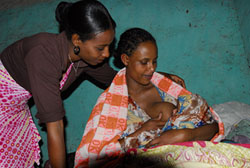35.5 Prevention and control of acute respiratory tract infections
Finally, we turn to the methods of prevention and control of acute respiratory tract infections (ARIs). You need to know about them so you can teach members of your community how they can protect their children and vulnerable adults from acute otitis media, pharyngitis and pneumonia.
Do you remember the difference between prevention and control?
Prevention measures, such as immunization, are applied before the occurrence of a communicable disease to reduce the risk that it will develop. Control measures, such as the treatment or isolation of cases, are applied after the occurrence of the disease, with the aim of reducing the transmission of the infectious agents to new susceptible people.
Prevention measures for ARIs include:
- Feeding children with adequate amounts of varied and nutritious food to keep their immune system strong.
- Breastfeeding infants exclusively (no other food or drinks, not even water) for the first six months (Figure 35.9); breastmilk has excellent nutritional value and it contains the mother’s antibodies which help to protect the infant from infection.
- Avoiding irritation of the respiratory tract by indoor air pollution, such as smoke from cooking fires; avoid the use of dried cow dung as fuel for indoor fires.
- Immunization of all children with the routine Expanded Programme on Immunization (EPI) vaccines in Ethiopia (Box 35.5).

Box 35.5 EPI vaccines that protect against acute respiratory tract infections
The dosages, schedules and vaccination routes for Hib, measles and pneumococcal vaccines are taught in the Immunization Module.
Immunize all children with:
- Haemophilus influenzae type b (Hib) vaccine at 6, 10 and 14 weeks; Hib is one of the five vaccines in the pentavalent vaccine used in Ethiopia.
- Measles vaccine at nine months of age.
- Pneumococcal vaccine, when it becomes available in the EPI, to protect them against Streptococcus pneumoniae bacteria.
You can help to control the spread of respiratory bacteria by educating parents to avoid contact as much as possible between their children and patients who have ARIs. You should also teach people with ARIs to cough or sneeze away from others, hold a cloth to the nose and mouth to catch the airborne droplets when coughing or sneezing, and disinfect or burn the cloths afterwards. Immunization also increases control, by reducing the reservoir of infection in the community and increasing the level of herd immunity (described in Study Session 1 in Part 1 of this Module).
35.4.4 Treatment of pneumonia
